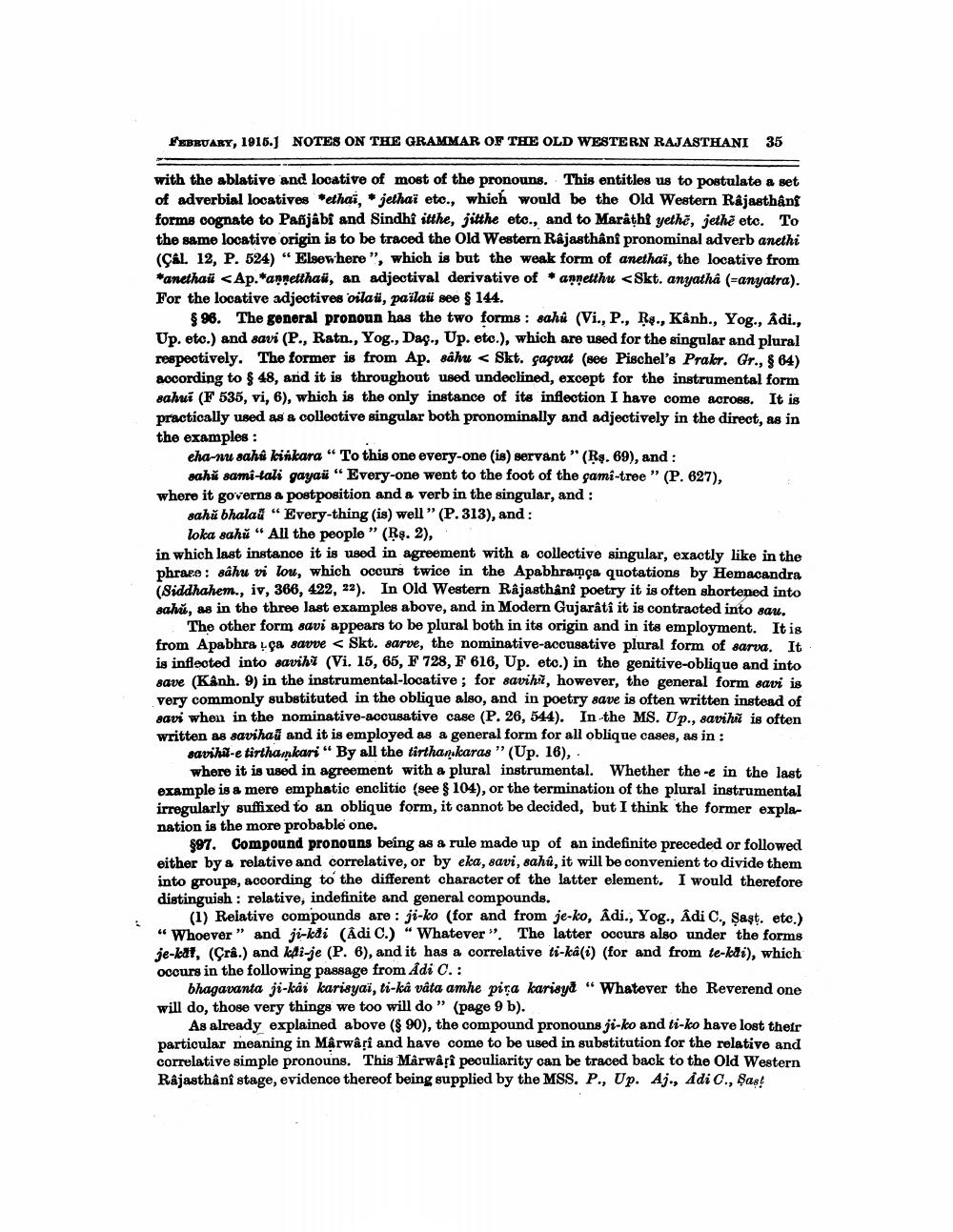________________
FEBRUARY, 1916.) NOTES ON THE GRAMMAR OF THE OLD WESTERN RAJASTHANI 35
with the ablative and locative of most of the pronouns. This entitles us to postulate a set of adverbial locatives ethai, * jethaï etc., which would be the Old Western Rajasthani forms cognate to Pañjábi and Sindhi itthe, jitthe etc., and to Marathi yethë, jethe eto. To the same locative origin is to be traced the Old Western Rajasthani pronominal adverb anethi (Çal. 12, P. 524) "Elsewhere", which is but the weak form of anethai, the locative from *anethaü <Ap.*annetthai, an adjectival derivative of * annetthu <Skt. anyatha (=anyatra). For the locative adjectives oilaü, pailaü see 144.
$98. The general pronoun has the two forms: sahů (Vi., P., R., Kênh., Yog., Ådi., Up, etc.) and savi (P., Ratn., Yog., Dag., Up. etc.), which are used for the singular and plural respectively. The former is from Ap. shu < Skt. çagvat (sec Pischel's Prakr. Gr., 8 64) according to $ 48, and it is throughout used undeclined, except for the instrumental form sahui (F 535, vi, 6), which is the only instance of its inflection I have come across. It is practically used as a collective singular both pronominally and adjectively in the direct, as in the examples :
eha-nu sahá linkara " To this one every-one (is) servant" (Rs. 69), and :
sahă sami-lali gayaü “Every-one went to the foot of the cami-tree" (P. 627), where it governs a postposition and a verb in the singular, and :
sahi bhalau “Every-thing (is) well " (P. 313), and :
loka sahi "All the people" (Rş. 2), in which last instance it is used in agreement with a collective singular, exactly like in the phrare : sâhu vi lou, which occurs twice in the Apabhramça quotations by Hemacandra (Siddhahem., iv, 366, 422, 22). In Old Western Rajasthani poetry it is often shortened into sahů, as in the three last examples above, and in Modern Gujarati it is contracted into sau.
The other form savi appears to be plural both in its origin and in its employment. It is from Apabbra ca savve < Skt. sarve, the nominative-accusative plural form of sarva. It is inflected into savihi (Vi. 15, 65, F 728, F 616, Up. etc.) in the genitive-oblique and into save (Kanh. 9) in the instrumental-locative ; for saviha, however, the general form savi is very commonly substituted in the oblique also, and in poetry save is often written instead of savi when in the nominative-accusative case (P. 26, 544). In the MS. Up., savihi is often written as savihaŭ and it is employed as a general form for all oblique cases, as in:
savihit-e tirthamkari" By all the tirthankaras" (Up. 16),
where it is used in agreement with a plural instrumental. Whether the -e in the last example is a mere emphatic enclitic (see & 104), or the termination of the plural instrumental irregularly suffixed to an oblique form, it cannot be decided, but I think the former explanation is the more probable one.
$97. Compound pronouns being as a rule made up of an indefinite preceded or followed either by a relative and correlative, or by eka, savi, sahů, it will be convenient to divide them into groups, according to the different character of the latter element. I would therefore distinguish: relative, indefinite and general compounds.
(1) Relative compounds are : ji-ko (for and from je-ko, Adi., Yog., Adi C., Şast. etc.) “Whoever" and ji-kdi (Adi C.) “Whatever". The latter occurs also under the forms je-lat, (Crâ.) and kli-je (P. 6), and it has a correlative ti-ka(i) (for and from te-kdi), which occurs in the following passage from Adi C.:
bhagavanta ji-kai karisyai, ti-kå våta amhe pir,a karisya " Whatever the Reverend one will do, those very things we too will do " (page 9 b).
As already explained above (8 90), the compound pronouns ji-ko and ti-ko have lost their particular meaning in Marwari and have come to be used in substitution for the relative and correlative simple pronouns. This Mârwârî peculiarity can be traced back to the Old Western Rajasthani stage, evidence thereof being supplied by the MSS. P., Up. Aj., Adi C., $as!




